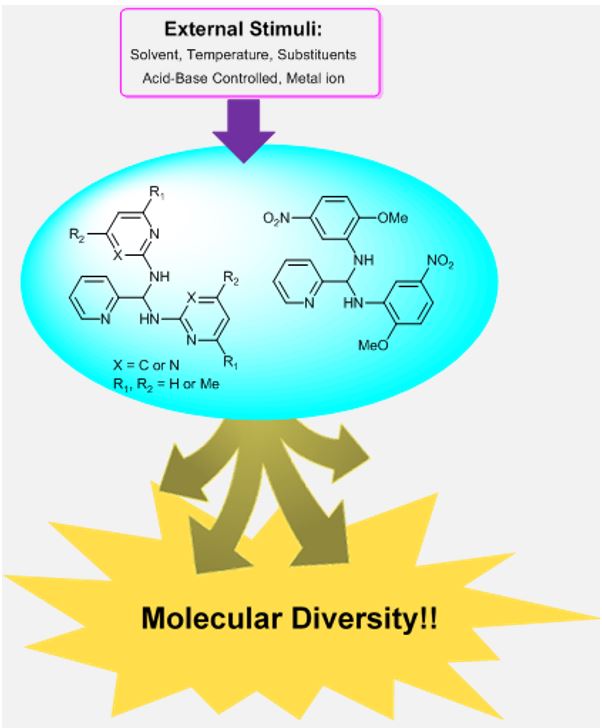高醫大研究生成功研發分子多樣性設計平台加速新藥的開發-可調控共價鏈的新創應用
高醫大研究生成功研發分子多樣性設計平台加速新藥的開發-可調控共價鏈的新創應用
「如何發展有效策略設計合成藥物」一直是科學家尋思的議題。除了沿循過去的結構藥物設計、結合AI的電腦輔助藥物設計,近年來也有人嘗試以動態組合式化學來設計抗菌藥物。然而要能以動態組合式化學的方法來篩選活性藥物,首要必須找到合適的動態共價系統。所謂「動態共價鍵」:就是一種可以溶劑、溫度、酸鹼…等環境變因來調控其生成和斷裂的共價鍵,通常是一個可逆的平衡反應。香粧品系林雅凡副教授與她的研究團隊,包括香粧品學系碩士畢業生邱紀銘、醫化系大四生朱宏豐、香粧品學系105級大學部畢業生張佳汶、與香粧品研究所碩二生陳靚云成功合成新型含雜環縮胺化合物,並探討此系統的物理有機化學性質,以實驗輔助理論計算的方式,確認該系統具備動態共價性質。該縮胺系統能在不同溶劑環境下,以亞胺、縮胺或半縮胺醚的形式存在。舉例來說,含嘧啶雜環縮胺在二甲基亞碸溶劑中以縮胺的型態呈現,然而在乙腈溶劑下,卻有10%的縮胺轉變成亞胺。如果置放於醇類環境,則該縮胺會完全轉變成半縮胺醚。而這些隨著環境變化而產生形態的轉變是可逆的,也因此能透過溶劑來調控分子形態的變化,並透過這樣的調控來增加分子的多樣性。他們的團隊更進一步發現,該系統的動態化學性質取決於溶劑與分子之間的nàπ*作用力。由於雜環官能基往往具有藥物活性,因此他們的研究結果未來亦可能應用於藥物設計上,透過動態共價化學性質增加分子多樣性,用「以一變多」的策略增多候選藥物的可能性,期使找到更有效率的藥物發展方法。

本校主要研究者之簡介:
香粧品學系 林雅凡 副教授
台大化學系博士,專長領域為生物無機化學與計算化學。目前實驗室研究興趣為: 結合理論計算與動態共價化學設計有潛力的金屬藥物應用於抗菌劑、抗癌藥物、與環境醫學上。
研究聯繫Email:
yafan@kmu.edu.tw
期刊出處:
RSC Adv., 2020, 10, 40421
研究全文下載:
(原標題: Physical organic studies and dynamic covalent chemistry of picolyl heterocyclic amino aminals)
https://pubs.rsc.org/en/content/articlepdf/2020/ra/d0ra08527h
Synthesis and dynamic covalent chemistry of heterocyclic-based aminals
Synthesis and dynamic covalent chemistry of heterocyclic-based aminals
The theme how to develop effective strategy in designing new drugs is always a hot issue to scientists. Structure-based and computer-aided drug designs are the two conventional ways to discover new drugs. Recently, some research groups have tried to introduce the concept of dynamic combinatorial chemistry (DCL) for developing new antibacterial agents. The primary condition that implementing DCL method to screen drug candidates is to develop a system exhibiting proper dynamic covalent chemistry properties. Dynamic covalent bonds are the covalent bonds that can form or break reversibly. In addition, the formation and the breaking of the covalent bonds can be controlled by the environmental stimuli, such as solvents, temperatures, and acid-base conditions. Dr. Ya-Fan Lin, who is an associate professor in Department of Fragrance and Cosmetic Science, and her team members, including Mr. Ji-Ming Ciou, obtaining his Master degree from Department of Fragrance and Cosmetic Science in the spring of 2020, Mr. Hong-Feng Zhu, a senior student in Department of Medicinal and Applied Chemistry, Miss Chia-Wen Chang, completing her bachelor degree from Department of Fragrance and Cosmetic Science in 2020, and Miss Jing-Yun Chen, currently a second year master’s student in Department of Fragrance and Cosmetic Science, succeeded in the synthesis of a series of novel heterocyclic-based aminals. After investigating the physical organic properties combined with the theoretical calculation study, they confirmed this aminal system displays dynamic covalent properties. The aminals can give different responses and convert to different derivatives in accordance with different solvent environments. For example, the pyrimidyl-based aminal structure can be kept in DMSO, while 10% of them will be transformed to imine form in acetonitrile nitromethane or acetone. Moreover, all of aminals have become hemiaminal ethers if using alcohol as solvents. Noteworthily, the environmental dependent transformations are all reversible, and therefore the molecular species can be switched by solvents. As a result, the dynamic covalent system can generate molecular diversity through solvent effect. The Lin’s group further proved that the existence of the dynamic covalent behaviors in this system is correlated to the nàπ* interaction between the solvent molecule and the aminal. This system is expected to have drug activities since the molecule consists heterocyclic fragments. In the future, the system can be utilized in drug design. Through creating more diversity by dynamic covalent properties, the “from one to more” strategy can generate more candidates in one time and hopefully leads to the buildup of an efficient approach for drug development.

Main researcher Intro.
Dr. Ya-Fan Lin, Associate Professor in Department of Fragrance and Cosmetic Science
Ya-Fan Lin obtained her PhD degree in Department of Chemistry, National Taiwan University. Her main research interests are in bioinorganic and computational chemistry. Her current research emphasizes a combination of computational and dynamic covelent chemistry strategies to design potential metallodrugs for application in antimicrobial, anticancer, and environmental medicine.
Author Email
yafan@kmu.edu.tw
Paper cited from:
RSC Adv., 2020, 10, 40421
Research Paper available online on website
(Title: Physical organic studies and dynamic covalent chemistry of picolyl heterocyclic amino aminals)
https://pubs.rsc.org/en/content/articlepdf/2020/ra/d0ra08527h

